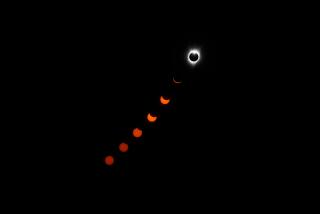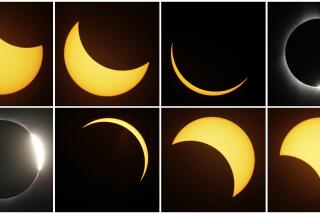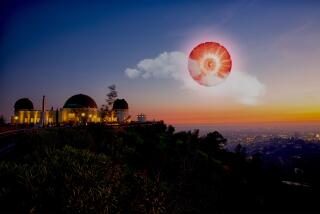In Music of the Spheres, Eclipse Strikes a Chilling Note
- Share via
ON THE BLACK SEA — “Still, it moves.”
So, it is said, Galileo muttered under his breath in the 17th century after publicly recanting (under threat of torture) his heretical revelation that the Earth moves around the sun.
Today we think we know the Earth moves. We think we know it’s a tiny blue marble floating in the black vastness of space. We think we know that our grasp on solid ground is as tenuous as the thin glue of gravity.
But for all our scientific knowledge, we believe in our hearts that we walk around on a steady Earth under the benign influence of an endless sky; that the eternal sun provides life support just for us.
Nothing shatters this smug self-assurance like a total solar eclipse--that eerie darkness at noon that falls when the moon places itself in the path of the sun’s light, sending a palpable chill through the atmosphere.
No wonder people become unglued. When the moon throws its cold shadow on our world, it cuts our connection with the star of the solar system. It exposes our fragility for all to see. It breaks the spell, dispels the illusion.
As when the house lights are turned up during a movie, we see ourselves for what we are. It’s a close encounter that pulls viscerally on our souls as surely as gravity pulls the Earth into the sun’s embrace. Even astronomers--who study this stuff--can’t account for its power.
An eclipse results from a marvelous choreography of coincidence that allows the tiny moon to cover the enormous sun--93 million miles away, and a million times larger than the Earth.
The diameter of the sun is 400 times that of the moon, but the sun is also 400 times farther away. Thus the moon can block the sun just as your thumb held at arm’s length can completely block a far-off mountain. In a match-up made in heaven, the tiny lunar interloper completely snuffs out the star of the solar system.
But like most life-shattering experiences, an eclipse sneaks up on you.
*
In the brilliant blue sky over the Black Sea last week, there was no warning of what was to come. Only in your imagination could you see that the moon was slowly making its way toward the momentous encounter. Only in your mind could you perceive the slow dance of the solar system that whirls the moon around the Earth and the Earth around the sun in wide elliptical arcs.
Even when the moon took its first tenuous bite out of the sun, it did so unseen, slipping in under cover of the sun’s glare. A stealth moon.
With special dark glasses, you could watch the size of the bite grow, the gouge increase. Without them, you noticed nothing special until about 15 minutes before the blackness set in.
Then, shadows turned razor sharp. Fingers turned into claws, and the hair standing up on arms turned people to beasts. The light grew strange, unnatural.
Suddenly, the moon hit the spot. Shades of night inexplicably dropped during the middle of the day, chilling the air like a ghost. Everything was upside down. There was a glow around the horizon, but the sun was setting “up there.”
Except there was no such thing as “up there” anymore. We were one of three spherical worlds slow-dancing in the solar system. Moreover, as the moon clicked into place, Venus lit up on the left; Mercury blinked on from the wings at the far right.
Blacker even than space, the disk of the sun sprouted a fringe of pink lace--loops of electrified gases leaping out from the star’s surface. Long gossamer threads of glowing “hair” spread far out in all directions.
Then, bingo! A flash of light, and the sun became a diamond ring out of a Tiffany advertisement--a golden circle with a spot of brilliant fire where the last rays leaked out between some high mountains on the moon.
At last, reluctantly, the moon let go. The three worlds will now go their separate ways until they meet again, in 2001, over the skies of Africa.
But the chill remains.
Like most shadows, the shade of the moon is scary. Its darkness throws an unwelcome light on the precariousness of our planetary existence. The universe is cold, dark, vast, empty. The sky is only skin deep. We stand exposed before the silent stars.
Indeed, the otherworldly quality of eclipses comes at least in part from the revelation that we are not the world, but only one of many worlds.
It moves. They all do.
More to Read
Sign up for Essential California
The most important California stories and recommendations in your inbox every morning.
You may occasionally receive promotional content from the Los Angeles Times.













